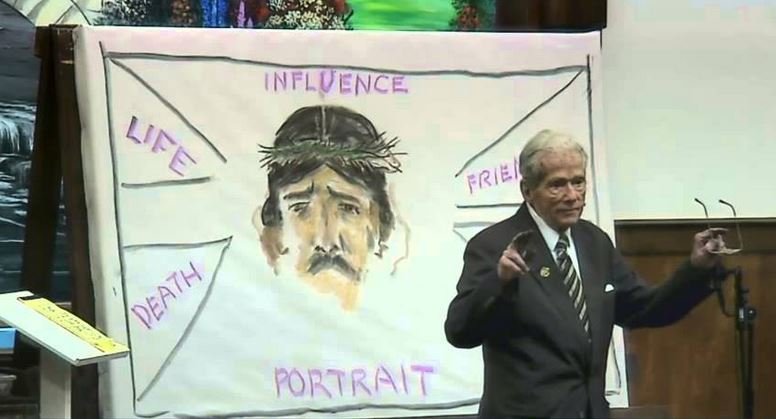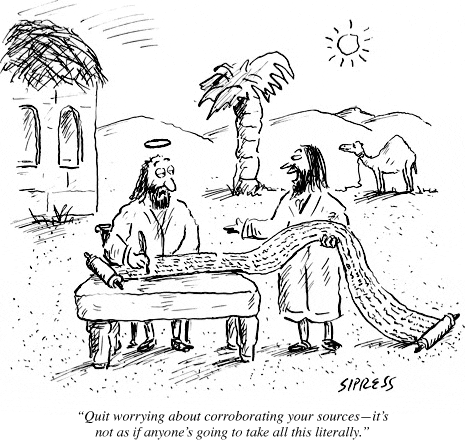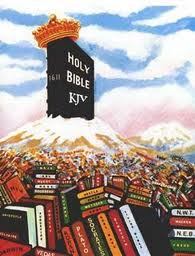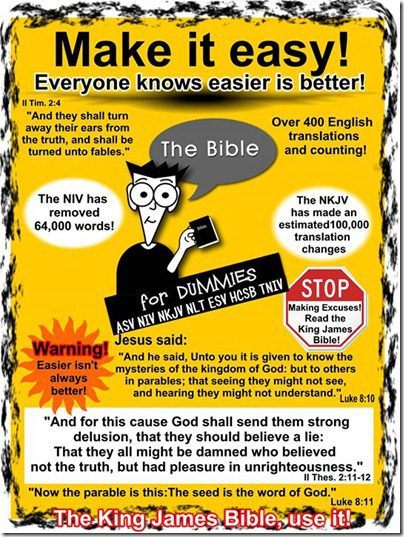
I grew up in a religious faith that taught me the Bible was the inspired, inerrant, and infallible Word of God. The word “inspired” meant that the Bible was the word of God; that holy men of old who wrote the Bible were told by the Holy Spirit exactly what to write. Some of my pastors and professors believed in the dictation theory. The authors of the Bible were mere automatons who wrote what God dictated to them. Other pastors believed that men wrote the Bible, thus their writing reflects their personality and culture. God, through some sort of unknown supernatural means, made sure that human influence on the Bible was in every way perfect and aligned with what he wanted to say.
Inspiration gets complicated when dealing with the question of WHAT, exactly, is inspired. Were the original manuscripts alone inspired? If so, there’s no such thing as the “inspired” Word of God because the original manuscripts do not exist. Are the extant manuscripts inspired? Some Evangelical pastors believe that the totality of existing manuscripts make up the inspired Word of God, and some pastors believe that certain translations — namely the King James Version — are the inspired Word of God. Regardless of how they answer the WHAT question, all of them believe that God supernaturally preserves his Word down through the ages, and the Bibles we hold in our hands is the very Words of God.
The word “inerrant” means “without mistake, contradiction, or error.” Some Evangelical pastors, knowing that every Bible translation has errors and mistakes, say they believe the original manuscripts are inerrant, and modern translations are faithful, reliable, and can be depended on in matters of faith, practice, morality, and anything else the Bible addresses. Of course, these men are arguing for the inerrancy of a text they had never seen Whatever the “original” manuscripts might have been, their exact wording and content are lost, likely never to be found.
The word “infallible” means incapable of error in every matter the Bible addresses. Thus, when the Bible speaks about matters of science and history, it is always true, and without error. No matter what scientists and historians say about a particular matter, what the Bible says is the final authority. That’s why almost half of Americans believe the Christian God created the universe sometime in the past 10,000 years.
At the age of nineteen, I enrolled in classes at Midwestern Baptist College in Pontiac, Michigan. Midwestern was an Independent Fundamentalist Baptist (IFB) institution that prided itself in turning out hellfire and brimstone preacher boys. My three years at Midwestern reinforced everything I had been taught as a youth. Every professor and chapel speaker believed the King James Bible was the inspired, inerrant, infallible Word of God. I was a seedling and Midwestern was a controlled-environment hothouse. Is it any wonder that I grew up to be a Bible thumper; believing that EVERY word in the Bible was straight from the mouth of God? If ever someone was a product of his environment, it was Bruce Gerencser.
I left Midwestern in 1979 and embarked on a ministerial career that took me to churches in Ohio, Texas, and Michigan. I stood before thousands of people with Bible held high and declared, THUS SAITH THE LORD! For many years, I preached only from the King James Bible. I believed it was the inspired, inerrant, infallible Word of God for English-speaking people. Towards the end of my ministerial career, I started using the New American Standard Bible (NASB), and after that, I began using the English Standard Version (ESV).
Many of my former colleagues in the ministry and congregants trace the beginning of my unbelief back to my voracious reading habit and my abandonment of the King James Bible. One woman, after hearing of my loss of faith. wrote to me and said that I should stop reading books and only read the B-I-B-L-E. She just knew that if I would stop reading non-Biblical books, my doubts would magically disappear. In other words, ignorance is bliss.
As I ponder my past and what ultimately led to my loss of faith, two things stand out: a book on alleged Bible contradictions and a list of the differences between the 1611 and 1769 editions of the King James Bible.
As I studied for my sermons, I would often come across verses or passages of Scripture that didn’t make sense to me. I would consult various commentaries and grammatical aids, and, usually, I was able to reconcile whatever it was that was giving me difficulty. Sometimes, however, I ran into what could only be described as contradictions – competing passages of Scripture. In these times, I consulted the book on alleged contradictions in the Bible. Often, my confusion would dissipate, but over time I began to think that the explanations and resolutions the book gave were shallow, not on point, or downright nonsensical. Finally, I quit reading this book and decided to just trust God, believing that he would never give us a Bible with errors, mistakes, and contradictions. I decided, as many Evangelicals do, to “faith” it.
For many years, the only Bible translation I used was the 1769 edition of the King James Bible. I had been taught as a child and in college that the original version — 1611 — of the King James Version and the 1769 version were identical. I later found out they were not; and that there were numerous differences between the two editions. (Please read the Wikipedia article on the 1769 King James Bible for more information on this subject.)
I remember finding a list of the differences between the two editions and sharing it with my best friend — who was also an IFB pastor. He dismissed the differences out of hand, telling me that even if I could show him an error in the King James Bible, he would still, by faith, believe the KJV was inerrant! Over the next few months, he would repeat this mantra to me again and again. He, to this day, believes the King James Bible is inerrant. I, on the other hand, couldn’t do so. Learning that there were differences between the editions forced me to alter my beliefs, at least inwardly. It would be another decade before I could admit that the Bible was not inerrant. But even then, I downplayed the errors, mistakes, and contradictions. I continued to read about the nature of the Biblical text, but I kept that knowledge to myself. It was not until I left the ministry that I finally could see that the Bible was NOT what my pastors and professors said it was; that it was not what I told countless congregants it was. Once the Bible lost its authority, I was then free to question other aspects of my faith, leading, ultimately, to where I am today. My journey away from Evangelicalism to atheism began and ended with the Bible.
Bruce Gerencser, 66, lives in rural Northwest Ohio with his wife of 45 years. He and his wife have six grown children and thirteen grandchildren. Bruce pastored Evangelical churches for twenty-five years in Ohio, Texas, and Michigan. Bruce left the ministry in 2005, and in 2008 he left Christianity. Bruce is now a humanist and an atheist.
Connect with me on social media:
Your comments are welcome and appreciated. All first-time comments are moderated. Please read the commenting rules before commenting.
You can email Bruce via the Contact Form.








 Several readers have asked me to explain the belief that the King James version of the Bible alone is the inspired, inerrant, infallible Word of God for English-speaking people. With this post, I hope to shed some light on what is commonly called King James-Onlyism; the belief that the only true Bible for English-speaking people is the King James version. While this system of belief is absurd and irrational, millions of Americans believe that the King James Bible is the one true Word of God. These same people, by the way, tend to be anti-evolution, young earth creationists. I grew up in King James-Only churches, attended a King James-Only Bible college, and believed, for many years, that the King James Bible was the perfect Word of God.
Several readers have asked me to explain the belief that the King James version of the Bible alone is the inspired, inerrant, infallible Word of God for English-speaking people. With this post, I hope to shed some light on what is commonly called King James-Onlyism; the belief that the only true Bible for English-speaking people is the King James version. While this system of belief is absurd and irrational, millions of Americans believe that the King James Bible is the one true Word of God. These same people, by the way, tend to be anti-evolution, young earth creationists. I grew up in King James-Only churches, attended a King James-Only Bible college, and believed, for many years, that the King James Bible was the perfect Word of God.